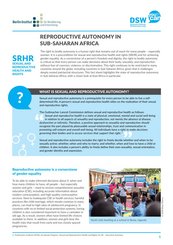
In this fact sheet, the DSW and the Berlin Institute take a look at the situation of reproductive rights in Sub-Saharan Africa.
Read more
More than 1.1 billion people live in Sub-Saharan Africa today, and this number is expected to double by 2050. Yet many governments in the region already struggle with providing sufficient schools, hospitals, food and clean water for their populations. Many countries are trapped in a vicious cycle of population growth and poverty. Social protection systems offer hope to break out of this cycle. They can lift the most vulnerable groups out of poverty, accelerate progress in education, health and nutrition, and indirectly reduce fertility rates.
For the first time, the Berlin Institute has investigated how social security measures affect population development in three countries in Sub-Saharan Africa: Tanzania, Zambia and Malawi. What potential impact do social transfers, health insurance and pensions have? Various studies show that girls whose families receive cash transfers attend school longer and become pregnant later. Free school meals cause children to attend classes more regularly and learn better. And people who receive a pension are more likely to have smaller families because they are less dependent on their children for support in old age. Data on how social protection systems potentially influence fertility rates remains sparse and, to date, has been given little consideration in German development cooperation policy. Our recommendations for action aim to begin to close this gap.
This study was funded by the German Federal Ministry for Economic Cooperation and Development (BMZ).
Executive Director
Telefon: +49 30 - 22 32 48 45
Contact via Mail: hinz@berlin-institut.org
© Berlin-Institut
Dual Student, Administration and Office Management
Telefon: +49 30 22 32 48 44
Contact via Mail: ring@berlin-institut.org
© Berlin-Institut
Student Assistant
Telefon: +49 30 - 22 32 48 45
Contact via Mail: engler@berlin-institut.org
© Berlin-Institut